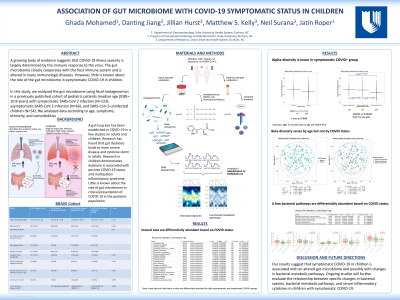Sunday Poster Session
Category: Pediatrics
P1178 - Association of Gut Microbiome With COVID-19 Status in Children in the BRAVE Cohort
Sunday, October 22, 2023
3:30 PM - 7:00 PM PT
Location: Exhibit Hall

- GM
Ghada Mohamed, MD
Duke University
Durham, NC
Presenting Author(s)
Award: Presidential Poster Award
Ghada Mohamed, MD, Danting Jiang, BS, Jillian Hurst, PhD, Matthew Kelly, MD, MPH, Neeraj Surana, MD, PhD, Jatin Roper, MD
Duke University, Durham, NC
Introduction: A growing body of evidence suggests that severity of illness from COVID-19 is largely determined by the patient’s aberrant immune response to the virus. The gut microbiota closely cooperates with the host immune system and is altered in many immunologic diseases. Our study attempts to explore the role of gut microbiome in COVID-19 in children through examining stool and plasma samples of children with symptomatic COVID-19, asymptomatic COVID-19, and SARS-CoV-2 negative (BRAVE cohort) as well as correlate differences with different age groups, symptoms, ethnicities, and comorbidities.
Methods: DNA was extracted from stool samples and submitted to Duke Sequencing and Genomic Technologies Core. Library prep was then done using shotgun sequencing. Analysis for different taxa and genomic pathways is currently done using MetaPhlAn2.
Results: Altered gut microbial composition was observed in children with symptomatic COVID-19, which was evidenced by lower alpha-diversity. While age impacted beta-diversity, COVID status had no role. When controlling for age, we identified several taxa that are differentially abundant between groups with significant difference in both of COVID-19 positive groups compared to COVID-19 negative group. Eisenbergiella, Frisingicoccus, Clostridiales, and Bitarella species are some of the bacteria differentially abundant in asymptomatic COVID-19 positive children. In symptomatic COVID-19 positive children, Bifidobacterium, Bacilli, Clostridium, Eisenbergiella, and Dielma were some of the species that were identified as differentially abundant. Moreover, we identified a few bacterial pathways that are differentially abundant, with most of them specifically altered in symptomatic COVID-19 group, including super pathway of L tyrosine biosynthesis, and energy pathways including anaerobic metabolism, TCA cycle and gluconeogenesis. Metabolomic and cytokine analysis are needed to identify and correlate these pathways, namely tyrosine biosynthesis and interferon responses.
Discussion: There was no difference in nasopharyngeal viral load between symptomatic and asymptomatic children in the BRAVE cohort. Gut dysbiosis has been implicated in several inflammatory and infectious conditions, including COVID-19 in adults. Identifying a possible relationship between gut microbiota and COVID-19 status in children may offer an explanation to differences in clinical presentation and reveal microbial species involved in disease pathogenesis and/or microbial biomarkers for disease severity.

Disclosures:
Ghada Mohamed, MD, Danting Jiang, BS, Jillian Hurst, PhD, Matthew Kelly, MD, MPH, Neeraj Surana, MD, PhD, Jatin Roper, MD. P1178 - Association of Gut Microbiome With COVID-19 Status in Children in the BRAVE Cohort, ACG 2023 Annual Scientific Meeting Abstracts. Vancouver, BC, Canada: American College of Gastroenterology.
Ghada Mohamed, MD, Danting Jiang, BS, Jillian Hurst, PhD, Matthew Kelly, MD, MPH, Neeraj Surana, MD, PhD, Jatin Roper, MD
Duke University, Durham, NC
Introduction: A growing body of evidence suggests that severity of illness from COVID-19 is largely determined by the patient’s aberrant immune response to the virus. The gut microbiota closely cooperates with the host immune system and is altered in many immunologic diseases. Our study attempts to explore the role of gut microbiome in COVID-19 in children through examining stool and plasma samples of children with symptomatic COVID-19, asymptomatic COVID-19, and SARS-CoV-2 negative (BRAVE cohort) as well as correlate differences with different age groups, symptoms, ethnicities, and comorbidities.
Methods: DNA was extracted from stool samples and submitted to Duke Sequencing and Genomic Technologies Core. Library prep was then done using shotgun sequencing. Analysis for different taxa and genomic pathways is currently done using MetaPhlAn2.
Results: Altered gut microbial composition was observed in children with symptomatic COVID-19, which was evidenced by lower alpha-diversity. While age impacted beta-diversity, COVID status had no role. When controlling for age, we identified several taxa that are differentially abundant between groups with significant difference in both of COVID-19 positive groups compared to COVID-19 negative group. Eisenbergiella, Frisingicoccus, Clostridiales, and Bitarella species are some of the bacteria differentially abundant in asymptomatic COVID-19 positive children. In symptomatic COVID-19 positive children, Bifidobacterium, Bacilli, Clostridium, Eisenbergiella, and Dielma were some of the species that were identified as differentially abundant. Moreover, we identified a few bacterial pathways that are differentially abundant, with most of them specifically altered in symptomatic COVID-19 group, including super pathway of L tyrosine biosynthesis, and energy pathways including anaerobic metabolism, TCA cycle and gluconeogenesis. Metabolomic and cytokine analysis are needed to identify and correlate these pathways, namely tyrosine biosynthesis and interferon responses.
Discussion: There was no difference in nasopharyngeal viral load between symptomatic and asymptomatic children in the BRAVE cohort. Gut dysbiosis has been implicated in several inflammatory and infectious conditions, including COVID-19 in adults. Identifying a possible relationship between gut microbiota and COVID-19 status in children may offer an explanation to differences in clinical presentation and reveal microbial species involved in disease pathogenesis and/or microbial biomarkers for disease severity.

Figure: Figure 1: Alpha-diversity is lower in the symptomatic COVID-19 +ve group.
Figure 2: Beta-diversity varies by age but not by COVID-19 status.
Figure 3: A few bacterial pathways are differentially abundant based on COVID-19 status.
Figure 2: Beta-diversity varies by age but not by COVID-19 status.
Figure 3: A few bacterial pathways are differentially abundant based on COVID-19 status.
Table: BRAVE Cohort Summary
Disclosures:
Ghada Mohamed indicated no relevant financial relationships.
Danting Jiang indicated no relevant financial relationships.
Jillian Hurst indicated no relevant financial relationships.
Matthew Kelly indicated no relevant financial relationships.
Neeraj Surana indicated no relevant financial relationships.
Jatin Roper indicated no relevant financial relationships.
Ghada Mohamed, MD, Danting Jiang, BS, Jillian Hurst, PhD, Matthew Kelly, MD, MPH, Neeraj Surana, MD, PhD, Jatin Roper, MD. P1178 - Association of Gut Microbiome With COVID-19 Status in Children in the BRAVE Cohort, ACG 2023 Annual Scientific Meeting Abstracts. Vancouver, BC, Canada: American College of Gastroenterology.

